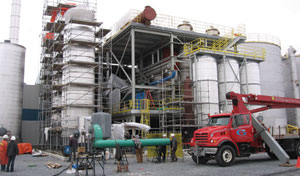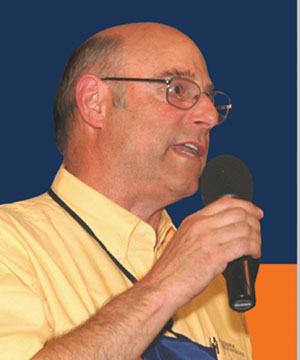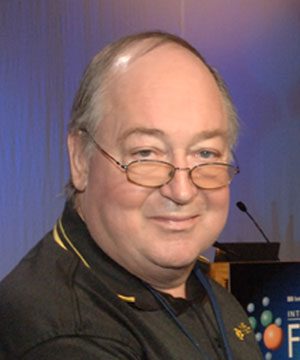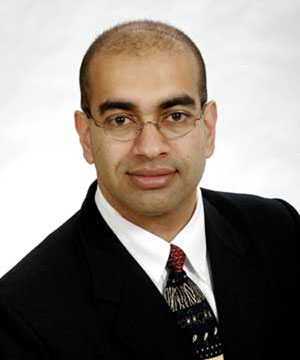Learning from the Experts





November 1, 2007
BY Craig Pilgrim
Education is the key to improving an industry. When it comes to the business of producing alcohol, The Alcohol School has long been a leading educational tool for professionals seeking to perfect their craft. The event has been an important educational resource for fuel ethanol and distilled beverage producers, providing valuable insight into the science of alcohol production.
Industry newcomers and veterans converged in Montreal, Quebec, Sept. 16-21 for the 27th annual North American Alcohol School. Ethanol Technology Institute hosted the event, which brought in 130 delegates and 20 speakers. The event was at full capacity, which depicts the growth over nearly three decades. The Alcohol School started out as a relatively small forum for educating students and discussing the finer points of the distillation process. In 2004, Ethanol Technology, a business unit of Lallemand Inc., took over management of the school under its educational arm, the Ethanol Technology Institute.
This year's course was designed to educate students in the fields of fuel ethanol and beverage alcohol production. While the bulk of the course was geared toward to the fuel ethanol process, a majority of the concepts apply to both industries. As the fuel ethanol industry continues to grow, so does the need to educate its lab, plant and management personnel. The course targeted groups with lectures, laboratory demonstrations, seminars and plant visits.
The Alcohol School is unique in its ability to bring in some of the world's foremost ethanol experts. The school began with an overview, including the growth and future, of the fuel ethanol and distilled beverage industries. A pair of Ethanol Technology's own industry veterans lent their expertise. Dave Kelsall discussed dry milling, cooking and the preparation of corn mash. He is the cofounder of The Alcohol School, and coauthors and co-edits The Alcohol Textbook. For his efforts, he was honored with the High Octane Award at the 2007 Fuel Ethanol Workshop and Expo (FEW). The award, formerly called the Distinguished Service Award, is a people's choice award that recognizes a person whose passion and unstoppable pursuits have significantly benefited the industry.
Dr. Mike Ingledew also lectured, as he has since 1986. He coordinates the European and North American schools and is senior editor of The Alcohol Textbook. Ingledew received the Award of Excellence at the 2006 FEW.
Bruce Dien, a chemical engineer with the USDA's Agricultural Research Service gave a primer on lignocellulosic biochemical conversion to fuel ethanol. Other novel production methods were highlighted, such as starch processing, grain fractionation, new fuel ethanol enzymes, high-gravity fermentation technology, cellulose technology and biomass usage. These topics were interwoven with pollution abatement, and the need for cleaning and sanitation to preserve ethanol yields. ICM Inc.'s Scott Kohl discussed pollution abatement in distilled alcohol and fuel alcohol plants.
DDGS was also discussed relative to fermentation design. Vijay Singh of the University of Illinois described new technologies in dry-grind corn processing.
While a bulk of the topics dealt specifically with the fuel ethanol industry, there was also information on mashing and the fermentation of potable spirits, general distillation for beverage alcohol, and the differences in whisky production from various regions. Overlapping technologies in the overall alcohol production were emphasized.
Hands-on Learning
In addition to classroom instruction, facility tours provided students with practical aspects in the application of lecture material. Attendees had the opportunity to visit two of Canada's premier ethanol industry-related sites: an ethanol plant and a yeast production facility.
GreenField Ethanol (formerly Commercial Alcohols) operates an ICM Inc.-designed plant in Varennes, Quebec, which started up in January 2007. It produces 32 MMgy (120 MMly) of fuel-grade ethanol, carbon dioxide and distillers dried grains. The facility is the first and only ethanol plant operating in Quebec. The Canadian government contributed CAN$18 million toward the plant's construction through the Ethanol Expansion Program. GreenField operates ethanol plants in Tiverton and Chatham, Ontario. The company also has additional plants under construction in Johnstown and Hensall, Ontario. Both are expected to begin production in 2008.
Students also visited Lallemand Inc.'s yeast plant, which provided an opportunity to learn how the fermentation ingredient is produced, processed and distributed for various industries worldwide.
Lallemand Inc. was founded in Montreal in the late 1800s by Fred Lallemand, a French immigrant. The company has 15 yeast plants located worldwide. The Montreal plant was built in 1915 with production of bakers yeast beginning in 1923. The facility is still in use today and is the site of Lallemand's administrative offices. It also produces a range of liquid, cake and dry yeasts.
Students also spent a day at the National Research Council of Canada's Biotechnology Research Institute, which houses the research laboratories of Ethanol Technology and Lallemand. The visit provided an opportunity to learn about yeast scale-up and process control, culture collection and microbiological demonstrations. It also displayed probiotics and the interaction of bacterial systems.
Another side of alcohol production was on display at Schenley Distillers in Salaberry-de-Valleyfield, Quebec. While the facility primarily distills alcohol, there was a comparison of alcohol production across various industries. The delegates interacted with processors and learned the techniques used in the production of distilled beverages. Distillation demonstrations and a sensory panel provided a feel for not only the science, but the art of making alcohol for the distilling industry.
Future Education
As interest in The Alcohol School continues to increase, the Ethanol Technology Institute has decided to cap the number of students. Rather than increasing attendance, the institute is concentrating on bringing the highest quality education to a manageable number of students. Ethanol Technology and the Ethanol Technology Institute are proud to have been part of the tradition for the past four years and look forward to many more. The Alcohol School and the Alcohol Textbook continue to provide a mix of educational materials to the industry.
Ingledew joined the Ethanol Technology team as a full-time employee. He'll continue to run The Alcohol School as well as other consulting duties.
The Alcohol School's 2008 North American session will be held Sept. 28-Oct. 3 in Montreal. The European session will be held in June in Toulouse, France. More information will be available in early 2008 at www.ethanoltech.com.
Craig Pilgrim is a global marketing and product development manager with Ethanol Technology. Reach him at cpilgrim@ethanoltech.com or (815) 986-8443.
The claims and statements made in this article belong exclusively to the author(s) and do not necessarily reflect the views of Ethanol Producer Magazine or its advertisers. All questions pertaining to this article should be directed to the author(s).
Industry newcomers and veterans converged in Montreal, Quebec, Sept. 16-21 for the 27th annual North American Alcohol School. Ethanol Technology Institute hosted the event, which brought in 130 delegates and 20 speakers. The event was at full capacity, which depicts the growth over nearly three decades. The Alcohol School started out as a relatively small forum for educating students and discussing the finer points of the distillation process. In 2004, Ethanol Technology, a business unit of Lallemand Inc., took over management of the school under its educational arm, the Ethanol Technology Institute.
This year's course was designed to educate students in the fields of fuel ethanol and beverage alcohol production. While the bulk of the course was geared toward to the fuel ethanol process, a majority of the concepts apply to both industries. As the fuel ethanol industry continues to grow, so does the need to educate its lab, plant and management personnel. The course targeted groups with lectures, laboratory demonstrations, seminars and plant visits.
The Alcohol School is unique in its ability to bring in some of the world's foremost ethanol experts. The school began with an overview, including the growth and future, of the fuel ethanol and distilled beverage industries. A pair of Ethanol Technology's own industry veterans lent their expertise. Dave Kelsall discussed dry milling, cooking and the preparation of corn mash. He is the cofounder of The Alcohol School, and coauthors and co-edits The Alcohol Textbook. For his efforts, he was honored with the High Octane Award at the 2007 Fuel Ethanol Workshop and Expo (FEW). The award, formerly called the Distinguished Service Award, is a people's choice award that recognizes a person whose passion and unstoppable pursuits have significantly benefited the industry.
Dr. Mike Ingledew also lectured, as he has since 1986. He coordinates the European and North American schools and is senior editor of The Alcohol Textbook. Ingledew received the Award of Excellence at the 2006 FEW.
Bruce Dien, a chemical engineer with the USDA's Agricultural Research Service gave a primer on lignocellulosic biochemical conversion to fuel ethanol. Other novel production methods were highlighted, such as starch processing, grain fractionation, new fuel ethanol enzymes, high-gravity fermentation technology, cellulose technology and biomass usage. These topics were interwoven with pollution abatement, and the need for cleaning and sanitation to preserve ethanol yields. ICM Inc.'s Scott Kohl discussed pollution abatement in distilled alcohol and fuel alcohol plants.
DDGS was also discussed relative to fermentation design. Vijay Singh of the University of Illinois described new technologies in dry-grind corn processing.
While a bulk of the topics dealt specifically with the fuel ethanol industry, there was also information on mashing and the fermentation of potable spirits, general distillation for beverage alcohol, and the differences in whisky production from various regions. Overlapping technologies in the overall alcohol production were emphasized.
Hands-on Learning
In addition to classroom instruction, facility tours provided students with practical aspects in the application of lecture material. Attendees had the opportunity to visit two of Canada's premier ethanol industry-related sites: an ethanol plant and a yeast production facility.
GreenField Ethanol (formerly Commercial Alcohols) operates an ICM Inc.-designed plant in Varennes, Quebec, which started up in January 2007. It produces 32 MMgy (120 MMly) of fuel-grade ethanol, carbon dioxide and distillers dried grains. The facility is the first and only ethanol plant operating in Quebec. The Canadian government contributed CAN$18 million toward the plant's construction through the Ethanol Expansion Program. GreenField operates ethanol plants in Tiverton and Chatham, Ontario. The company also has additional plants under construction in Johnstown and Hensall, Ontario. Both are expected to begin production in 2008.
Students also visited Lallemand Inc.'s yeast plant, which provided an opportunity to learn how the fermentation ingredient is produced, processed and distributed for various industries worldwide.
Lallemand Inc. was founded in Montreal in the late 1800s by Fred Lallemand, a French immigrant. The company has 15 yeast plants located worldwide. The Montreal plant was built in 1915 with production of bakers yeast beginning in 1923. The facility is still in use today and is the site of Lallemand's administrative offices. It also produces a range of liquid, cake and dry yeasts.
Students also spent a day at the National Research Council of Canada's Biotechnology Research Institute, which houses the research laboratories of Ethanol Technology and Lallemand. The visit provided an opportunity to learn about yeast scale-up and process control, culture collection and microbiological demonstrations. It also displayed probiotics and the interaction of bacterial systems.
Another side of alcohol production was on display at Schenley Distillers in Salaberry-de-Valleyfield, Quebec. While the facility primarily distills alcohol, there was a comparison of alcohol production across various industries. The delegates interacted with processors and learned the techniques used in the production of distilled beverages. Distillation demonstrations and a sensory panel provided a feel for not only the science, but the art of making alcohol for the distilling industry.
Future Education
As interest in The Alcohol School continues to increase, the Ethanol Technology Institute has decided to cap the number of students. Rather than increasing attendance, the institute is concentrating on bringing the highest quality education to a manageable number of students. Ethanol Technology and the Ethanol Technology Institute are proud to have been part of the tradition for the past four years and look forward to many more. The Alcohol School and the Alcohol Textbook continue to provide a mix of educational materials to the industry.
Ingledew joined the Ethanol Technology team as a full-time employee. He'll continue to run The Alcohol School as well as other consulting duties.
The Alcohol School's 2008 North American session will be held Sept. 28-Oct. 3 in Montreal. The European session will be held in June in Toulouse, France. More information will be available in early 2008 at www.ethanoltech.com.
Craig Pilgrim is a global marketing and product development manager with Ethanol Technology. Reach him at cpilgrim@ethanoltech.com or (815) 986-8443.
The claims and statements made in this article belong exclusively to the author(s) and do not necessarily reflect the views of Ethanol Producer Magazine or its advertisers. All questions pertaining to this article should be directed to the author(s).
Advertisement
Advertisement
Advertisement
Advertisement
Upcoming Events





